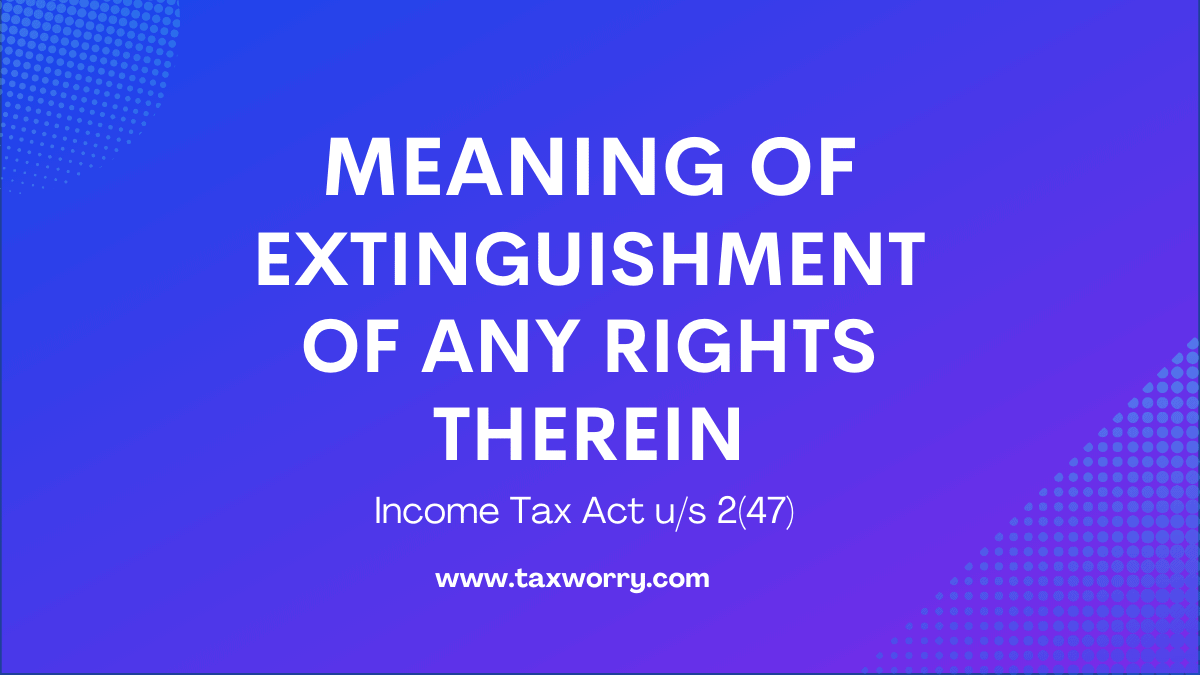Meaning of tax terms
Meaning of “Extinguishment of any rights therein”
The meaning of extinguishment of any rights therein under section 2(47) of the Income Tax Act is not defined in the act itself. But we can take guidance from decisions by various high courts. Here are excerpts of courts orders in which the Hon’ble High Court tried to explain the meaning of meaning of extinguishment of any rights therein.

Meaning of extinguishment of any rights therein defined by court
The phrase ‘extinguishment of any rights therein’ used in section 2(47) of the Income Tax Act came up before various high courts as detailed under :
1. Hon’ble Supreme Court explained the meaning of ‘extinguishment of any rights therein’ while delivering judgment in Vania Silk Mills (P.) Ltd. Vs. CIT [1991] 59 taxman 3/191 ITR 647 (sc) as under :
Meaning : The expression ‘extinguishment of any rights therein’ will have to be confined to the extinguishment of rights on account of transfer and cannot be extended to mean any extinguishment of right independent of or otherwise than on account of transfer.
2. Hon’ble Madras high court explained the meaning of ‘extinguishment of any rights therein’ while delivering judgment in C. Leo Machodo Vs. CIT [1988] 38 taxman 296/17 ITR 744 (Mad.) as under :
Meaning : The mere fact that the definition of ‘transfer’ is an inclusive definition does not mean that every extinguishment of the rights of the owner of the capital asset howsoever brought about will necessarily amount to transfer. Unless the owner of the capital asset is divested of his right by the process of extinguishment resorted to by some agency and unless there is consideration for such extinguishment, the mere fact that the asset stands destroyed either by the fire or by sinking in the sea, as in the present case, there can be no transfer of the capital asset for the purpose of sections 45 and 48.
3. Hon’ble Kolkata high court explained the meaning of ‘extinguishment of any rights therein’ while delivering judgment in Union Carbide India Ltd. Vs. CIT [1995] 80 taxman 197 (Cal.) as under :
Meaning : To adopt the phraseology of section 2(47) ‘transfer’ in relation to an asset includes ‘extinguishment of any rights therein’. The word ‘therein’ cannot be treated as surplusage and some meaning has to be given to it.
4. Hon’ble ITAT-Mumbai explained the meaning of ‘extinguishment of any rights therein’ while delivering judgment in Kantilal T. Sanghvi Vs. ACIT [2004] 89 ITD 282 (Mum. – Trib.) as under :
Meaning : According to the rule of noscitur a sociis, the expression ‘extinguishment of any rights therein’ would take colour from the associated words and expression will have to be restricted to the sense analogous to them. If the legislature intended to extend the definition to any extinguishment of right, it would not have included the obvious instances of transfer, viz., Sale, exchange, etc. Hence, the expression ‘extinguishment of any rights therein’ will have to be confined to the extinguishment of rights on account of transfer and cannot be extended to mean any extinguishment of rights independent of or otherwise than on account of transfer.
Section 2(47) of Income Tax Act
2. (47) “transfer”, in relation to a capital asset, includes,—
(i) the sale, exchange or relinquishment of the asset ; or
(ii) the extinguishment of any rights therein ; or
(iii) the compulsory acquisition thereof under any law ; or
(iv) in a case where the asset is converted by the owner thereof into, or is treated by him as, stock-in-trade of a business carried on by him, such conversion or treatment ; or
(iva) the maturity or redemption of a zero coupon bond; or
(v) any transaction involving the allowing of the possession of any immovable property to be taken or retained in part performance of a contract of the nature referred to in section 53A of the Transfer of Property Act, 1882 (4 of 1882) ; or
(vi) any transaction (whether by way of becoming a member of, or acquiring shares in, a co-operative society, company or other association of persons or by way of any agreement or any arrangement or in any other manner whatsoever) which has the effect of transferring, or enabling the enjoyment of, any immovable property.
Explanation 1.—For the purposes of sub-clauses (v) and (vi), “immovable property” shall have the same meaning as in clause (d) of section 269UA.
Explanation 2.—For the removal of doubts, it is hereby clarified that “transfer” includes and shall be deemed to have always included disposing of or parting with an asset or any interest therein, or creating any interest in any asset in any manner whatsoever, directly or indirectly, absolutely or conditionally, voluntarily or involuntarily, by way of an agreement (whether entered into in India or outside India) or otherwise, notwithstanding that such transfer of rights has been characterised as being effected or dependent upon or flowing from the transfer of a share or shares of a company registered or incorporated outside India;
In this article, you can get guidance from high courts on the meaning of extinguishment under section 2(47) of the Income Tax Act.
Updated up to Finance Act 2021
